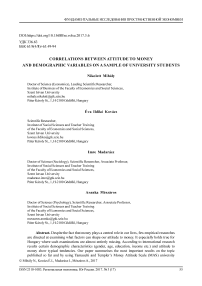Correlations between attitude to money and demographic variables on a sample of university students
Автор: Mihly Niko Lett, Kovcs Va Ildik, Madarsz Imre, Mszros Aranka
Журнал: Региональная экономика. Юг России @re-volsu
Рубрика: Фундаментальные исследования пространственной экономики
Статья в выпуске: 3 (17), 2017 года.
Бесплатный доступ
Despite the fact that money plays a central role in our lives, few empirical researches are directed at examining what factors can shape our attitude to money. It especially holds true for Hungary where such examinations are almost entirely missing. According to international research results certain demographic characteristics (gender, age, education, income etc.) and attitude to money show typical tendencies. Our paper summarises the most important results on the topic published so far and by using Yamauchi and Templer’s Money Attitude Scale (MAS) university students were asked ( n = 305) about their attitude to money. The results, in line with previous international analyses, show the correlation between attitude to money and certain demographic characteristics. For men money would rather mean the source of power and prestige while women are more money-consious looking for special offers and sales. Regarding age, the anxiety over money is the strongest for those over 35 when compared with other generations...
Money attitude, saving, consciousness, demographic differences
Короткий адрес: https://sciup.org/149131199
IDR: 149131199 | DOI: 10.15688/re.volsu.2017.3.6
Список литературы Correlations between attitude to money and demographic variables on a sample of university students
- Almási M. Üveggolyók Az ezredvég globális játszmái. Budapest, Helikon Kiadó, 1998. 173 p.
- Andersen J., Camp P., Kiss E., Wakita S., Weyeneth J. The money attitude scale: what college students think about green stuff. The Proceedings of the American council on Consumer Interests, 1988, no. 39, pp. 377-384.
- Babbie E. A társadalomtudományi kutatás gyakorlata. Budapest, Balassi Kiadó, 2003. 564 p.
- Bailey W., Gustafson W. Gender and genderrole orientation differences in attitudes and behaviors toward money. Proceedings of the Fourth Annual Conference of the Association of Financial Counselling and Planning Educators, 1986, no. 1, pp. 11-20.
- Baker P.M., Hagedorn R.B. Attitudes to money in a random sample of adults: factor analysis of the MAS and MBBS scales, and correlations with demographic variables. The Journal of Socio-Economics, 2008, no. 37, pp. 1803-1814.
- Felvi. A tendenciákban nincs változás 2011- ben sem. 2011. URL: http://webcache.googleusercontent.com/search?q=cache:j QaKyMm_Na4J:www.felvi.hu/felveteli/ponthatarok_rangsorok/jelentkezok_es_felvettek/jelentkezok_2011altalanos_gyors%3FitemNo%3D2+2011-ben+a+fels%C5%91oktat% C3%A1sba+jelentkez%C5%91k+43,43%25-a+f%C3% A9rfi,+56,57%25-a+n%C5%91&cd=2&hl=hu&ct=clnk &gl=hu&client=firefox-a.
- Furnham A. Many sides to the coins. The psychology of money usage. Personality and Individual Differences, 1984, no. 5 (5), pp. 501-509.
- Furnham A., Argyle M. The psychology of money. London, Routledge, 1998. 332 p.
- Goldberg H., Lewis R.T. Money Madness: The Psychology of Saving, Spending, loving, and Hating Money. London, Speingwood Books, 1978. 268 p.
- Gresham A.B., Fontenot G. F. Different attitudes of the sexes toward money: an application of the money attitude scale. In: Gordon P., Kellerman B. (Eds.). Advances in Marketing. Southwestern Marketing Association, 1989, pp. 380-384.
- Heller J. Most és egykor. Budapest, Gabo Könyvkiadó és Keresk Kft, 1998. 296 p.
- Heyne P. A gazdasági gondolkodás alapjai. A mindenható piac. Budapest, Tankönyvkiadó, 1991. 575 p.
- Lim V.K.G., Teo T.S.H. Sex, financial hardship and locus of control: an empirical study of attitudes towards money among Singaporean Chinese. Journal of Economic Psychology, 1997, no. 18 (18), pp. 369-386.
- Lynn R. The secret of the miracle economy. London, SAU, 1991. 156 p.
- Medina J.F., Saegert J., Gresham A. Comparison of Mexican-American and Anglo-American attitudes toward money. The Journal of consumer Affairs, 1996, no. 30 (1), pp. 124-145.
- Nedbam J.F., Saegert J., Gresham A. Comparison of Mexican-American and Anglo-American attitudes toward money. The Journal of Consumer Affairs, 1996, no. 30 (1), pp. 124-144.
- Prince M., Gender and money attitudes of young adults. Proceedings of the Conference on Gender and Consumer Behavior, 1991, pp. 284-291.
- Roberts J.A., Sepulveda C.J. Demographics and money attitudes: a test of Yamauchi and Templer’s money attitude scale in Mexico. Personality and Individual Differences, 1999, no. 27 (1), pp. 19-35.
- Rubinstein W.D. Survey report on money. Psychology today, 1999, no. 5, pp. 24-44.
- Rudmin F.W. German and Canadian data on motivations for ownership: was Pythagoras right? Advances in Consumer Research, 1990, no. 17, pp. 176-181.
- Tang T.L.P. The meaning of money revisited. Journal of Organizational Behavior, 1992, no. 13 (2), pp. 1997-2002.
- Tang T.L.P. The meaning of money: extension and exploration of the Money ethic Scale in a sample of University students in Taiwan. Journal of Organizational Behavior, 1993, no. 14, pp. 93-99.
- Tang T.L.P., Gilbert P.R. Attitudes toward money as related to intrinsic and extrinsic job satisfaction, stress and work-related attitudes. Personality and Individual Differences, 1995, no. 19 (3), pp. 327-332.
- Tatzel M. "Money worlds" and well-being: An integration of money dispositions, materialism and pricerelatedbehavior. Journal of Economic Psychology, 2002, no. 23 (1), pp. 103-126.
- Weber M. A protestáns etika és a kapitalizmus szelleme. Budapest, Gondolat, 1982. 272 p.
- Wernimount P. & Fitzpatrick S. The meaning of money. Journal of Applied Psychology, 1972, no. 56, pp. 218-226.
- Yablonsky L. The emotional meaning of money. New York, Gardner Press, 1991. 212 p.
- Yamauchi K.T., Templer D.L. The development of money attitude scale. Journal of Personality Assessment, 1982, no. 46 (May), pp. 522-528.


